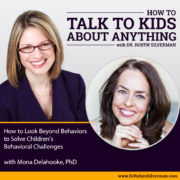How to Look Beyond Behaviors to Solve Children’s Behavioral Challenges with Mona Delahooke, PhD
Special guest: Mona Delahooke, PhD. A kindergartener whose father pinches her on the arm at night- once for every time her teacher wrote the girl’s name on the behavior chart at school that day.
A three year old in foster care who was found sitting in a car by the side of the road with his mother, who was passed out at the wheel. His daycare-center teacher sends him to a time out room for challenging behaviors.
A ten year old is diagnosed with Oppositional Defiant Disorder. His teachers say he is chronically disruptive, always seeking attention, His problematic behaviors began after his family relocated to a new state.
My next guest says that we are too quick to look at behaviors as attempts to annoy and disrupt—rather than what they truly represent- observable responses to our internal and external experiences. And here’s the problem with that- When we fail to recognize that many behaviors represent the body’s response to stress, not intentional misbehavior, we expend effort on techniques designed to help children logically connect their thoughts, emotions and behaviors and change them—when they simply can’t yet. Instead, we need to see the behavior that is problematic and confusing and NOT ask ourselves how do we get rid of it? But rather, what is this telling us about the child? The answer will then guide us to coming up with the best approach to help that individual child thrive.
Mona Delahooke, Ph.D. is a clinical child psychologist with a passion for supporting families and children. She has worked widely with multidisciplinary teams in the areas of trauma, developmental and emotional differences for 25 years. She is a senior faculty member of the Profectum Foundation and is a trainer and consultant to schools and agencies including the Los Angeles Department of Mental Health. Her blog, The Visible Parent, and book, Social & Emotional Development in Early Intervention (2017) explore the latest translational applications of neuroscience to social and emotional development. She is also the author of Beyond Behaviors: Using Brain Science and Compassion to Understand and Solve Children’s Behavioral Challenges.

